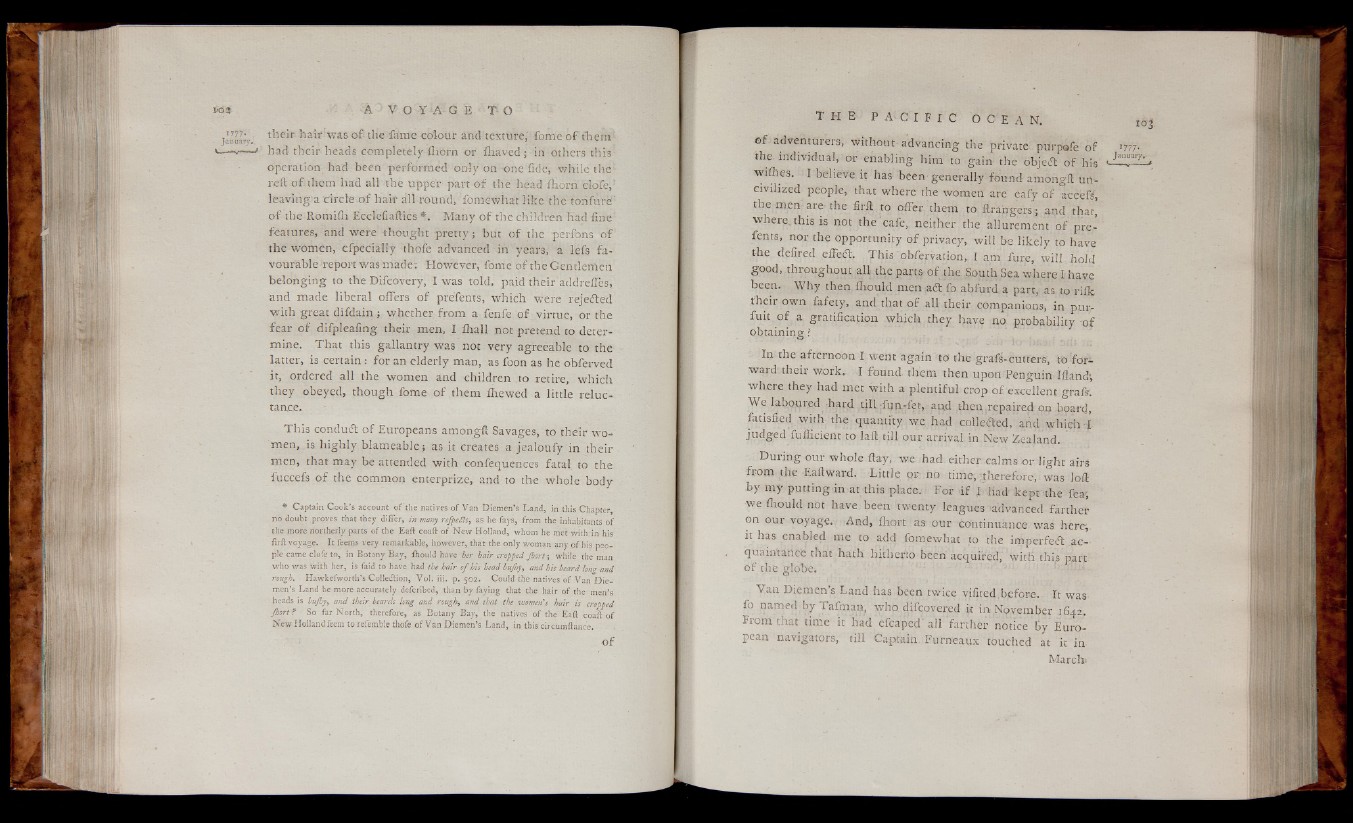
their hair was of the fame colour and texture, fome of them
had their heads completely -ihorn or Ihaved • in others this
operation, had been performed only on one fide, while the;
reft o f them had all the upper part of the head fhorn elofe,:
leaving'a circle of hair all round, fomewhat like the torifure:
of the Romiih Ecclefiaftics *. Many of the children had fine
features, and were thought pretty; but of the perfons of
the women, efpecially thofe advanced in years, a lefs favourable
report was made: However, fome of the Gentlemen
belonging to the Difcovery, I was told, paid their addreffes,
and made liberal offers of prefents, which were rejected
with great difdain; whether from a fenfe of virtue, or the
fear of difpleafing their men, I fhall not pretend to determine.
That this gallantry was not very agreeable to the
latter, is certain : for an elderly man, as foon as he obferved
it, ordered all the women and children to retire, which
they obeyed, though fome of them flrewed a little reluctance.
This conduft of Europeans amongft Savages, to their women,
is highly blameable; as it creates a jealoufy in their
men, that may be attended with confequences fatal to the
fuccefs of the common enterprize, and to the whole body
* Captain Cook’s account of the natives of Van Diemen’s Land, in this Chapter,
no doubt proves that they differ, in many refpefis, as he fays, from the inhabitants of
the more northerly parts of the Eaft coaft of New Holland, whom he met with in his ,
firft voyage. It feems very remarkable, however, that the only woman any of his people
came clofe to, in Botany Bay, ihould have her hair cropped Jhort; while the man
who was with her, is faid to have had the hair of his head bufoy, and his beard long and
rough. Hawkefworth’s Collection, Vol. iii. p. 502. Could the natives of Van Diemen’s
Land be more accurately defcribed, than by faying that the hair of the men’s
heads is bufhy, and their beards long and rough, and that the women’s hair is cropped
Jhort f So far North, therefore, as Botany Bay, the natives of the Eaft coaft of
New Holland feem to refemble thofe of Van Diemen’s Land, in this circumftance.
of
o f adventurers, without advancing the private, purpsfe of ’777-
the-individual, or enabling him to gain the objesft of his >.J-™aly.L>
wifhes. I believe it has been generally found amongft uncivilized
people, that where the women are eafy of aceefs,
the men are the firft to offer them to ilrangers; and that,
where, this is not the'cafe, neither the allurement of prefents,
nor the opportunity of privacy, will be likely to have
the defired, effedt, This obferyafion, I am. fure, will hold
good, throughout all the parts: of the South Sea where I have
been. Why then ihould men adi fo abfurd a part, as to rifle
rheir own fafety, and that of all their companions, in pur-
fuit o f a gratification which they have no probability o f
obtaining?
In the afternoon I went again to the grafs-cuttcrs, to for-
ward their work. I found them then upon Penguin Ifland*.
where they had met with a plentiful crop o f excellent graft.
We laboqied -hard tjll ■fijp.-fet, and then .repaired on board,
fatisfied with the quantity we had collected, and which I
judged fufficient to laft till our arrival in New Zealand.
During our whole flay, we had. either calms or light airs
from the Eaftward. Little or no time, therefore,¡was loft
by my putting in at this place. For i f I had kept the feay
we ihould not have been twenty leagues 'advanced farther-
on our voyage. And, fhort as our continuance was here,
it has enabled me to add fomewhat to the imperfedt acquaintance
that hath hitherto been acquired, with this part
of the globe. - ' fjsjp
Van Diemen s Land has been twice vifited,before. It was
fo named by Tafman, who difcovered it in .November 1642.
From that time it had efcaped all farther notice fry1 European
navigators, till Captain. Furneaux touched at it in
Marcff